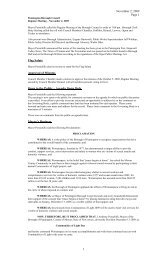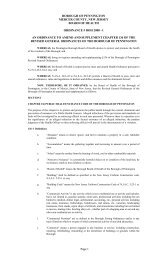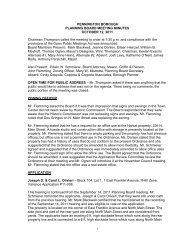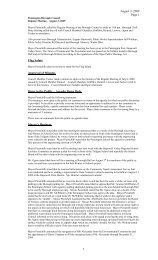Lyme & other Tick Borne diseases brochure
Lyme & other Tick Borne diseases brochure
Lyme & other Tick Borne diseases brochure
Create successful ePaper yourself
Turn your PDF publications into a flip-book with our unique Google optimized e-Paper software.
How can tick-borne <strong>diseases</strong><br />
be prevented<br />
❖<br />
❖<br />
Perform <strong>Tick</strong> Checks:<br />
1. Remove ticks from your clothes before<br />
going indoors.<br />
2. Wash your clothes with hot water and<br />
dry them using high heat for at least one<br />
hour.<br />
3. Perform a daily tick check after being<br />
outdoors. Inspect all parts of your body,<br />
including your armpits, scalp, and groin.<br />
Safely remove any found ticks:<br />
1. Use fine-tipped tweezers.<br />
2. Grab the tick close to the skin. Do not<br />
twist or jerk the tick, as this may cause<br />
the mouthparts to break off and remain<br />
in the skin.<br />
3. With a steady motion, gently pull<br />
straight up until all parts of the tick are<br />
removed.<br />
4. After removing the tick, clean your skin<br />
with soap and warm water.<br />
5. Contact your healthcare provider if you<br />
develop any symptoms.<br />
Where can I find more<br />
information about tick-borne<br />
disease<br />
NJDHSS Communicable<br />
Disease Service<br />
http://www.nj.gov/health/cd/<br />
CDC <strong>Tick</strong>-<strong>Borne</strong> Diseases<br />
http://www.cdc.gov/ticks/<strong>diseases</strong>/<br />
CDC Updates on Mosquito Repellent<br />
http://www.cdc.gov/ncidod/dvbid/<br />
westnile/RepellentUpdates.htm<br />
<strong>Tick</strong>-<strong>Borne</strong><br />
DISEASES<br />
❖<br />
Do not use petroleum jelly, hot matches,<br />
nail polish remover or <strong>other</strong> products to<br />
remove a tick.<br />
New Jersey Department of<br />
Health & Senior Services<br />
Public Health Services Branch<br />
Communicable Disease Service<br />
PO Box 369<br />
Trenton, NJ 08625<br />
Phone: 609-826-4872<br />
Feb 2010<br />
C1490
What are tick-borne <strong>diseases</strong><br />
<strong>Tick</strong>-borne <strong>diseases</strong> are bacterial illnesses that<br />
spread to humans through infected ticks. The<br />
most common tick-borne <strong>diseases</strong> in<br />
New Jersey are:<br />
❖ <strong>Lyme</strong> disease<br />
❖ Ehrlichiosis<br />
❖ Anaplasmosis<br />
❖ Rocky Mt. spotted fever<br />
❖ Babesiosis<br />
How do tick-borne <strong>diseases</strong><br />
spread<br />
<strong>Tick</strong>-borne <strong>diseases</strong> are not spread between two<br />
people, but rather rely on ticks for transmission.<br />
<strong>Tick</strong>s become infected by micro-organisms<br />
(bacteria or protozoan parasites) when feeding<br />
on small infected mammals (e.g. mice and<br />
voles). Different tick-borne <strong>diseases</strong> are caused<br />
by different micro-organisms and it is possible<br />
to be infected with more than one tick-borne<br />
disease at the same time.<br />
These are the ticks in New Jersey that may<br />
carry disease causing micro-organisms:<br />
❖ Black-legged “deer” tick (Ixodes scapularis)<br />
❖ Lone star tick (Amblyomma americanum)<br />
❖ American dog tick (Dermacentor variabilis)<br />
T I C K - B O R N E D I S E A S E S<br />
What are the symptoms of<br />
tick-borne <strong>diseases</strong><br />
The early signs of tick-borne <strong>diseases</strong> generally<br />
include:<br />
❖ Skin rash<br />
❖ General tiredness<br />
❖ Fever and/or chills<br />
❖ Headache<br />
❖ Stiff neck<br />
❖ Muscle aches<br />
❖ Joint pain<br />
❖ Dizziness<br />
How soon after a tick bite do<br />
symptoms occur<br />
<strong>Lyme</strong> disease<br />
Ehrlichiosis<br />
Anaplasmosis<br />
Rocky Mt. spotted fever<br />
Babesiosis<br />
3-30 days<br />
5-10 days<br />
5-21 days<br />
5-10 days<br />
7-56 days<br />
How are tick-borne <strong>diseases</strong><br />
diagnosed<br />
Most tick-borne <strong>diseases</strong> are diagnosed through<br />
blood tests and by discussing symptoms with a<br />
healthcare provider.<br />
How can tick-borne <strong>diseases</strong><br />
be prevented<br />
❖<br />
❖<br />
❖<br />
❖<br />
❖<br />
❖<br />
❖<br />
❖<br />
Avoid wooded areas with dense shrubs, high<br />
grass, and a lot of leaves, as these are places<br />
where ticks are likely to hide.<br />
If you hike in the woods, stay to the center<br />
of the trail to avoid overgrown vegetation.<br />
Take extra precautions in May, June, and<br />
July when ticks that transmit disease are<br />
most active.<br />
Make your yard less attractive to ticks: mow<br />
lawns, clear brush, and remove leaf litter.<br />
Keep ground under bird feeders clean.<br />
Keep playground equipment, decks, and<br />
patios away from yard edges and trees.<br />
When outdoors, apply EPA-registered insect<br />
repellent on exposed skin and clothing<br />
according to the instructions on the product<br />
label. DEET may be used on skin and<br />
Permethrin should only be used on clothing<br />
and outdoor gear.<br />
Cover up. Wear long, solid, and lightcolored<br />
clothing with pants tucked into<br />
socks. This will help prevent ticks from<br />
getting under your clothes and attaching to<br />
your skin.<br />
Black-legged<br />
“deer” tick<br />
Lone star tick<br />
Who gets tick-borne<br />
<strong>diseases</strong><br />
American dog<br />
tick<br />
Anyone who is bitten by an infected tick may<br />
get a tick-borne disease. People who spend a lot<br />
of time outdoors have a greater risk of<br />
becoming infected.<br />
What is the treatment for<br />
tick-borne <strong>diseases</strong><br />
<strong>Tick</strong>-borne <strong>diseases</strong> caused by bacteria (<strong>Lyme</strong><br />
disease, ehrlichiosis, anaplasmosis, and Rocky<br />
Mt. spotted fever) can be treated with<br />
antibiotics. Babesiosis is caused by a parasite<br />
similar to malaria, and is treated with antiprotozoal<br />
drugs. It is important to watch for<br />
symptoms and talk to your healthcare provider<br />
if you’ve been bitten by a tick. Early treatment<br />
can be very effective.






